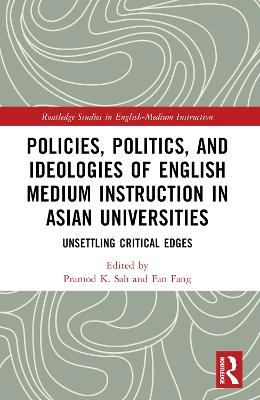
Policies, Politics, and Ideologies of English-Medium Instruction in Asian Universities
Routledge (Verlag)
978-1-032-00185-2 (ISBN)
- Lieferbar (Termin unbekannt)
- Versandkostenfrei innerhalb Deutschlands
- Auch auf Rechnung
- Verfügbarkeit in der Filiale vor Ort prüfen
- Artikel merken
Against the backdrop of uncritical promotions of English-medium instruction (EMI) in higher education globally, this edited volume maps out the political, ideological, and policy-related issues of EMI programs in multilingual and multicultural universities in Asia.
In this volume, EMI researchers and practitioners involved in different Asian countries and regions have collaboratively unpacked the critical dimensions of EMI programs in higher education, with a goal to provide must-needed resources for researchers, graduate students, higher education leaders, and policymakers. This volume is the first of its kind in that it provides an exclusive and critical tapestry of EMI at multilingual universities from all parts of Asia, including Central Asia (Kazakhstan), East Asia (Mainland China, Korea, Japan, and Taiwan), South Asia (Bangladesh and Nepal), Southeast Asia (Brunei, Malaysia, Philippines, Thailand, and Vietnam), and Western Asia (United Arab Emirates). The key takeaway for the reader is to not only understand the current phenomenon of EMI in Asian universities but to also learn the dark side of its policies, programs, and practices that have led to unequal teaching and learning spaces in diverse societies.
This collection will be of interest to scholars and policymakers in English-medium instruction, English language teaching, TESOL, and applied linguistics.
Pramod K. Sah is a Postdoctoral Research Associate at the University of Calgary’s Werklund School of Education, Canada, and an Honorary Norham Fellow at the Department of Education, University of Oxford. He obtained his PhD from the University of British Columbia, Canada, where he was also a Killam Laureate. His research areas include language planning and policy, English as a medium instruction, translanguaging, TESOL and social justice, and language ideology. His research has appeared in journals such as Linguistics and Education, Applied Linguistics Review, Ethnicities, Journal of Multilingual and Multicultural Development, International Journal of Bilingual Education and Bilingualism, International Multilingual Research Journal, Asia Pacific Journal of Education, Asian Englishes, among others, and various edited volumes. [ORCiD ID: 0000-0002-6200-8898] Fan Fang obtained his PhD from the Centre for Global Englishes, University of Southampton, UK. He is currently a Professor at the College of Liberal Arts, Shantou University, China. His research interests include Global Englishes, sociolinguistics, language attitude, identity, intercultural communication, and language teaching and learning. He has published articles in journals including Asia Pacific Journal of Education, Asian Englishes, ELT Journal, English Today, Journal of Multilingual and Multicultural Development, Language, Culture and Curriculum, Language Teaching Research, Lingua, RELC Journal, System, among others. His latest books include a monograph titled Re-positioning accent attitude in the Global Englishes paradigm (Routledge) and an edited volume (co-edited with Dr Handoyo Widodo) titled Critical Perspectives on Global Englishes in Asia (Multilingual Matters). [ORCiD ID: 0000-0002-4210-9042]
Foreword
List of Contributors
Introduction: Toward critical English-medium instruction in multilingual universities
Pramod K. Sah and Fan Fang
Part 1: Policy goals, hidden agenda, and challenges in EMI programs
EMI in higher education in Kazakhstan: Policy supports and challenges
Sulushash Kerimkulova, Bridget Goodman and Kamila Aitzhanova
English medium instruction in Japan: Changes and challenges faced by faculty and students
Samantha Curle, Yuwei Lin and Ikuya Aizawa
Policy development for English medium instruction at a Nepali University: Unpacking hidden motivations and agendas
Karna Rana and Pramod K. Sah
English medium instruction (EMI) in higher education in Taiwan: A review and critical reflection on why, how, and for whom
Kao Chin-Ling Gupta and Angel M. Y. Lin
Part 2: Language ideologies and practices in EMI programs
University lecturers’ beliefs and practices about the use of first languages and English in EMI: Case studies from Malaysia and Thailand
Roger Barnard, Zuwati Hasim and Banchakarn Sameephet
The role of English and the L1 in English medium instruction at universities in Vietnam and Thailand
Kari Sahan, Nicola Galloway and Jim McKinley
Language use and language choice at an EMI university in Brunei: Student perspectives
Ishamina Athirah Gardiner, Sarah Boye and Suciyati Sulaiman
Understanding EMI teachers’ language beliefs and use in content-area classrooms at Chinese universities
Rui Yuan and Xuyan Qiu
Examining the "M" in EMI Courses at Korean universities: Is it English-medium or English-mixed?
Juyoung Song
Part 3: Discourses of educational and social inequalities in EMI programs
Language, class, and coloniality in medium of instruction projects in the Philippines
Ruanni Tupas and Romylyn Metila
English as a medium of instruction and inequality: Exploring private sector higher education in Bangladesh
Md. Al Amin and M. Obaidul Hamid
English medium instruction and linguistic diversity in Emirati higher education: Expectations and hardships
Sarah Hopkyns
AfterwordAndy Kirkpatrick
Index
| Erscheinungsdatum | 16.10.2024 |
|---|---|
| Reihe/Serie | Routledge Studies in English-Medium Instruction |
| Zusatzinfo | 10 Tables, black and white; 7 Line drawings, black and white; 7 Illustrations, black and white |
| Verlagsort | London |
| Sprache | englisch |
| Maße | 152 x 229 mm |
| Themenwelt | Schulbuch / Wörterbuch ► Wörterbuch / Fremdsprachen |
| Geisteswissenschaften ► Sprach- / Literaturwissenschaft ► Sprachwissenschaft | |
| Sozialwissenschaften ► Pädagogik ► Erwachsenenbildung | |
| ISBN-10 | 1-032-00185-2 / 1032001852 |
| ISBN-13 | 978-1-032-00185-2 / 9781032001852 |
| Zustand | Neuware |
| Haben Sie eine Frage zum Produkt? |
aus dem Bereich


